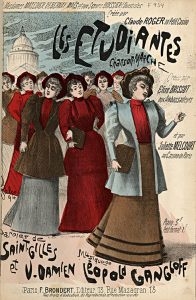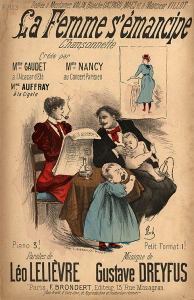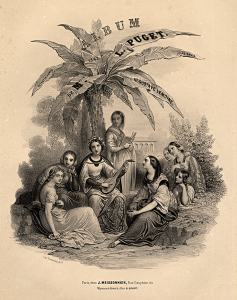The Marvin Duchow Music Library’s new exhibition, Women, Work, and Song in Nineteenth-Century France, explores women’s work and the cultural work about women in popular music, drawing on a selection of pieces from the Library’s 19th-Century French Sheet Music Collection.
Women contributed in important ways to the popular music industry in nineteenth-century France. They worked as composers, poets, and performers; they also hosted salons, directed theatres, and earned a living as pedagogues and publishers. The exhibition highlights women’s activities not only within the popular music industry but also more generally within French society, as women joined the workforce, participated in revolutions and armed conflicts, and supported the burgeoning women’s movement.

Les étudiantes: chanson-marche. Saint-Gilles & V. Damien (lyrics); Léopold Gangloff (music). Paris: F. Brondert, [1894].
The exhibition follows a chronological narrative, tracing the shift in genres, venues, and means of dissemination of French song over the course of the century. It begins on the third floor by considering the culture of music-making in salons in the early nineteenth century, and highlighting women’s compositions and performances of romances and other song genres. The fourth floor explores the development of the commercial entertainment industry in Paris in the second half of the century, with the café-concerts of the Second Empire and the music halls and cabarets of the Third Republic. A map of Paris along with illustrative material and songs from some of the more famous venues and performers help to acquaint the public with the atmosphere of the café-concerts and cabarets. The influence of the Parisian café-concert industry reached all the way to Montréal: the exhibition displays the rise and fall of Montréal’s Eldorado café-concert, and follows the Parisian cabaret star Yvette Guilbert on her tours to the city over a twenty-year period. The fifth floor analyzes the musical responses to the women’s movement in the final decades of the century, and investigates the instrumentalization of women’s images for ideological and political purposes.

La femme s’émancipe: chansonnette. Léo Lelièvre (lyrics); Gustave Dreyfus (music).Paris: F. Brondert, [1894].
Women, Work, and Song in Nineteenth-Century France opens November 8, 2018, and will run until June 2019. The exhibition is located on all three floors of the Marvin Duchow Music Library, Elizabeth Wirth Music Building, 527 Sherbrooke Street West (library entrance on the 3rd floor).


